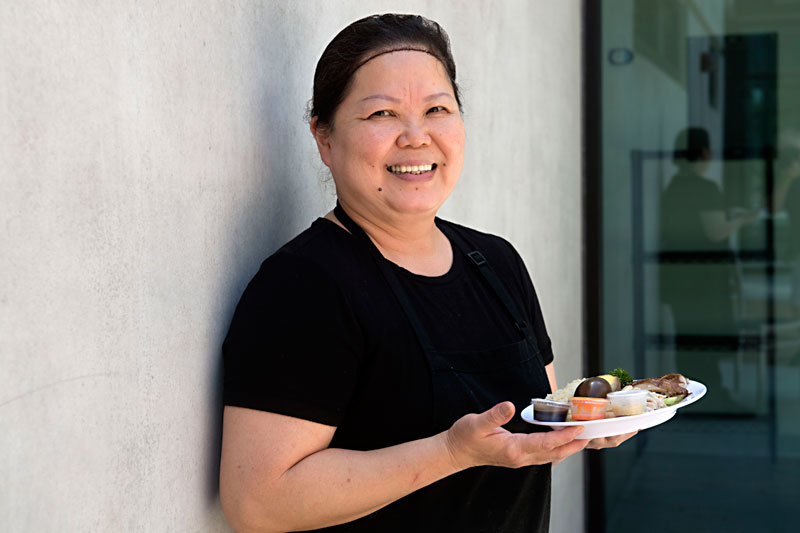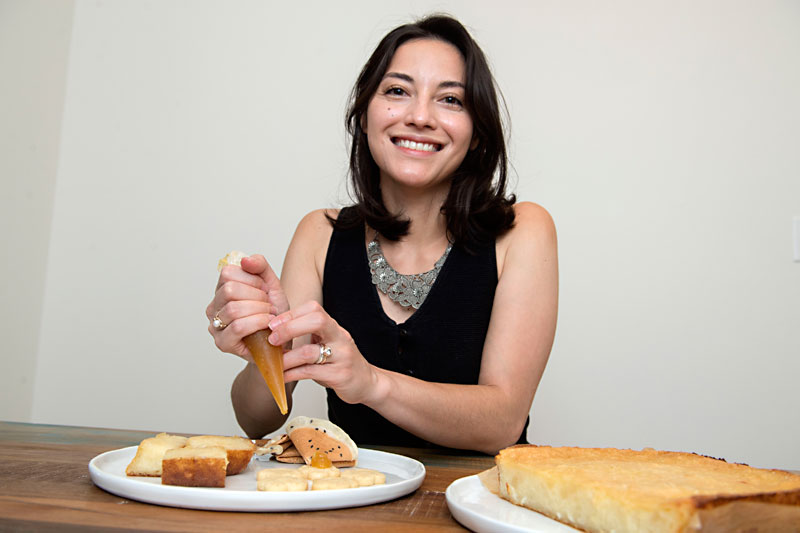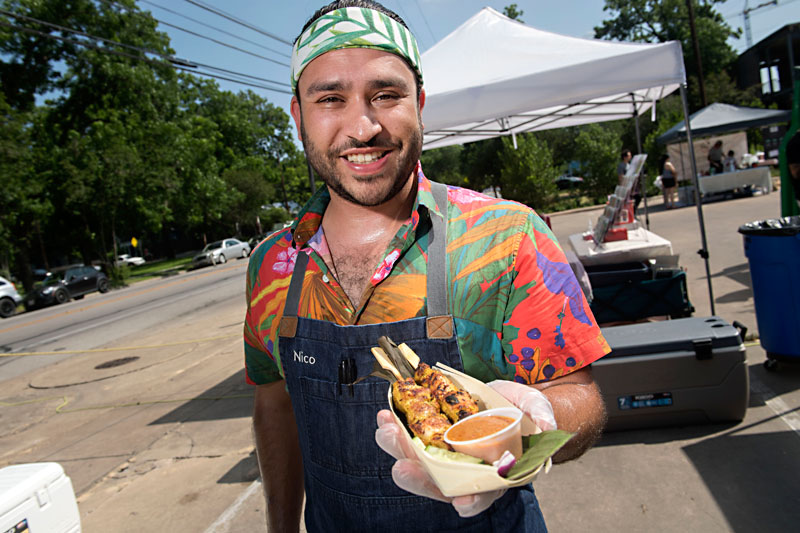Virtual Brands and Pop-Ups Are Making Southeast Asian Street Food Accessible to Austin
Downloading hawker culture
By Clara Wang, Fri., June 3, 2022
Southeast Asia is synonymous with street food. Around Singapore, Malaysia, and Indonesia, hawker stalls are the ultimate democratizer: Young urban professionals, government workers, schoolchildren, and apron-clad grandmas alike can be found shouting orders over noisy markets and squatting on plastic stools hunched over a steaming bowl of something absolutely delicious that costs less than $3.
Today, flavors from these countries are arriving in Austin's developing Asian food scene via the modern-day hawker stall: internet-driven pop-ups and virtual brands.
For those who aren't up on the latest restaurant technology lingo, a virtual brand restaurant is one that exists purely for online orders. Chefs cook out of a rented commercial kitchen, or "ghost kitchen," and customers order for pickup or delivery through apps like Uber Eats and DoorDash. Pop-up restaurants are temporary events where cooks can showcase their offerings at any location that allows them to set up, and mostly promote and announce events through social media like Instagram or Twitter. By cutting out the significant financial and time investments required for a physical restaurant location, virtual brands and pop-ups allow aspiring chefs and food lovers to experiment and share their wares at a low cost and on their own schedule.
While virtual brands and pop-ups have increased in prominence among urban food scenes since the pandemic struck, a new generation of home chefs and pop-up founders are taking advantage of newly lowered barriers to entry and showcasing nuanced takes on Southeast Asian cuisine, charging the Austin Asian food scene with international flavors that would've been extremely difficult to market a decade ago.
"People like me don't have the funds or the time to start a full-time restaurant, but I like cooking street foods," says Nicolai McCrary, founder of Malaysian pop-up Penang Shack and full-time food photographer and writer. "We can only do that now because of pop-ups and the low barrier to entry."
Southeast Asian street foods especially lend themselves to informal markets due to their low ingredient costs and communal nature. Plus, as McCrary notes, they're not commonly found around Austin.
"I was craving my mom's food and I was stuck at home," says McCrary. "So I decided to just start making it. If there had been restaurants serving some of these dishes, it's hard to say if I would've made the same choice."
As with the democratizing power of a bowl of steaming noodles from a street vendor, Southeast Asian street food sellers like Chicken Rice Joe, Austin Kuih Co., and Penang Shack are able to use the internet economy to bring nostalgic tastes of Singapore and Malaysia to the Austin community at an affordable cost for both sellers and customers.
Chicken Rice Joe
Chicken Rice Joe (5610 N. I-35, chickenricejoe.com) is a virtual brand founded and run by Singaporean Malaysian friends and partners Joe Tah and Lily Tjie, available for delivery or pickup on their website as well as Uber Eats, DoorDash, Grubhub, Lunchdrop, ezCater, and ChowNow out of their Club Kitchen facility by I-35. Singapore-born-and-bred Tah is a full-time IT professional who originally came to Austin 11 years ago after being hired by Electronic Arts as an architect, and found himself missing the hawker foods his homeland is famous for: fatty, aromatic nasi lemak (rice steamed with coconut milk in a pandan leaf); fried chicken wings coated with sambal sauce; and Hainanese chicken rice – the king of Singaporean street food – unassuming-looking but bursting with savory, slow-cooked flavors (best paired with achar, a spicy pickle popular all over Southeast Asia).
After years of re-creating such dishes at home for his family, Tah decided to start the virtual brand Chicken Rice Joe in June 2021 with longtime friend, Malaysian immigrant Tjie, due to a mutual love of Southeast Asian food and her decades of professional cooking experience in cafeterias and at her own restaurant in Dobie Mall, Japanese Oishi Sushi, which closed in 2016. Thanks to the virtual brand model, they were in business within weeks of him conceptualizing the idea and bringing Tjie on board.
"I opened a restaurant because I want to eat Singaporean food," says Tah. "We cook based on memory of the taste, the street food we grew up with."
"I just like to cook and eat," laughs Tjie. "This business, you need to love your job. It takes long hours and it's not easy but if you have someone who has the same idea to help you grow your business, nothing feels hard."
Along with the Singaporean and Malaysian street foods mentioned above, they also offer an ever-changing rotation of classic Southeast Asian snacks inspired by their childhoods (Yeo's canned drinks are responsible for many sugar-high Asian kids), Tjie's concoctions (toffeelike coconut milk dessert gula melaka sago), and Tah's travels (Taiwanese fried chicken).
Their clientele is mostly from the Asian diaspora – India, Vietnam, China – with a few sentimental Singaporean and Malaysian regulars.
"I have people from Singapore who are like, 'This taste immediately brings me back home,'" says Tah. "This is what real chicken rice tastes like in Singapore. This is not Americanized."
Austin Kuih Co.
Ava Pendleton, founder and sole proprietor of Austin Kuih Co. (austinkuihco.com), spent childhood summers selling kuih from a stall by the side of the road with her aunt in Malaysia. Kuih is a sticky rice flour dessert enjoyed throughout Southeast Asia derived from Chinese gao, but with ingredients like coconut, pandan, and palm sugar that make it uniquely Malaysian.
"It goes back to the spice trade; we do have a lot of shared history and flavors as Southeast Asian people, and those flavors are inflected by colonizers," says Pendleton. "Sometimes I'm at a pop-up, and I'll be like, 'Have you tried Malaysian kuih?' I compare it to tapas – little bites. Some are sweet, some are savory, some are fried."
Born in Ohio to a Malaysian mother who came to the United States on a national scholarship (where she met Pendleton's American father), Pendleton bounced between Malaysia and the States during her early childhood and moved to Austin a few years ago. She started the Austin Kuih Co. in 2021 as a home baking project that turned into a cottage food business with multiple pop-ups and local acclaim, and she recently quit her job in education to be a full-time pastry chef. She currently makes everything herself and operates as a cottage food operator, batch-cooking for online orders and pickups along with pop-up events.
"What I want to do is honor traditional methods. And then what can we add, as Texans?" Pendleton says. "What ingredients don't have to come so far from us, and are sustainable?"
Penang Shack
Austin pop-up Penang Shack (penangshack.com) – currently consisting of founder "Nasi" Nicolai McCrary, "Durian" Don Smolik, "Milo" Mike Moore, and "Sambal" Sarah Kayfus – initially began as a fundraiser for the Austin Justice Coalition in 2020. McCrary had so much fun cooking and selling food he grew up with from his mother's hometown of Penang, Malaysia, he never stopped. They serve Malaysian classics like nasi lemak, satay (skewers marinated in spices), beef rendang (coconut beef stew), and laksa (curried noodle soup), along with whatever inspiration strikes up.
"I don't think this could've existed 10 years ago," says McCrary, who moved to Austin in 2008 for college. "Austin's always had a decent scene for Vietnamese food and somewhat for Chinese. But we're finally starting to get more Filipino, Malaysian, Indonesian, and Laotian and things like that, which I think [has] been really exciting."
Austin Is Ready for an Asian Market
Chicken Rice Joe, Austin Kuih Co., and Penang Shack are just the tip of the iceberg; many local virtual brands and pop-ups, like Kat's Hand-Baked, Mr. Noodle-San, and Gan Bei Gals, have found success and a following. The next step may be a more organized, co-op-style marketplace that charges a nominal fee to vendors and customers to cover maintenance costs, much like the 812 Outdoor Market that opens every weekend and charges $2 a car.
McCrary hopes the future of Southeast Asian vendors in Austin will be similar to the communal markets of their origin countries: collaborative efforts that work together as established, regular marketplaces.
"These pop-ups are the perfect platform to set up night markets," says McCrary, who is working on setting up regular night markets in a sustainable manner for home chefs who may not be accustomed to serving large-scale events. "I want to have these more than once a year. Just having more of these collaborative events where multiple pop-ups can come together, it'll create a really cool Austin. It'll create something really exciting."














